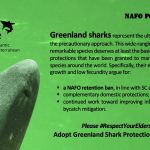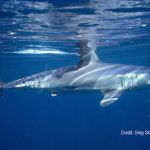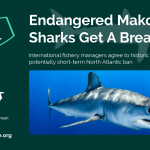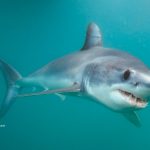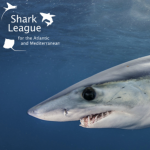Northwest Atlantic fishing nations ban retention of longest-lived vertebrate
Porto, September 23, 2022. Today, the mysterious Greenland shark – thought to have the longest lifespan of any vertebrate – was granted new, historic protections by the Northwest Atlantic Fisheries Organization (NAFO) on the final day of its annual meeting. The US and Canada, with support from the UK and the EU, proposed and secured a science-based ban on retaining the species from international waters.
“The incredibly slow growing, long-lived, and wide-ranging Greenland shark clearly deserves the precautionary international protection that was agreed today,” said Sonja Fordham, president of Shark Advocates International, who testified in support of the proposed ban on behalf of the Shark League coalition. “We thank the United States and Canada for their steadfast efforts over several years to secure science-based safeguards for this extraordinary animal and we urge all Parties to adopt similar protections for their waters.”
Scientists have estimated that Greenland sharks may live 400 years and don’t reproduce until about age 150, leaving populations exceptionally vulnerable to overfishing. In 2018, the NAFO Scientific Council recommended a complete ban on retaining Greenland sharks, along with measures to collect information and minimize incidental mortality associated with “bycatch.” That year, the US and EU secured catch reporting requirements and a partial ban (on targeting the species in international waters).
The new measure bans Greenland shark fishing, retention, transshipment, and landing (part or whole) and applies to international waters of the Northwest Atlantic. Exceptions are possible where domestic bans on discarding fish apply (Iceland, Norway, Faroe Islands, and Greenland), but only for dead Greenland sharks captured incidentally; commercial profit from such landings is prohibited. Parties also underscored previous commitments to report on efforts to minimize incidental catches and mortality of Greenland sharks. NAFO scientists will continue their work to identify times and areas where Greenland shark bycatch is high and will provide additional conservation advice in 2024.
“As we celebrate this important shark conservation advance, we encourage NAFO Parties to follow up promptly with required reports on Greenland shark catches and bycatch mitigation,” said Shannon Arnold, marine policy coordinator for Ecology Action Centre. “This information is essential to the next key steps of identifying hotspots and changing fishing practices to minimize harm.”
Greenland sharks are associated with high latitudes of the North Atlantic and Arctic waters at depths to 3000 meters, but specimens have been reported as far south as Belize. Growing to more than six meters (21 feet), they were heavily fished in the early 1990s for liver oil. Today, Greenland sharks are primarily caught incidentally and sometimes used for their meat in Iceland and Greenland.
Media contact: Sonja Fordham email: sonja@sharkadvocates.org Tel: +1 202 436 1468.
Notes to Editors: The Shark League is a coalition of Shark Advocates International (a project of The Ocean Foundation), Ecology Action Centre, Shark Trust, and PADI AWARE Foundation formed with support from the Shark Conservation Fund to advance science-based shark policies for the Atlantic and Mediterranean.
NAFO Contracting Parties include Canada, Cuba, Denmark (in respect to the Faroe Islands and Greenland), the European Union, France (in respect to Saint Pierre et Miquelon), Iceland, Japan, Republic of Korea, Norway, Russian Federation, Ukraine, and the US.
Northwest Atlantic Fisheries Organization (NAFO) 2022 Position Statement: Skates & Sharks

